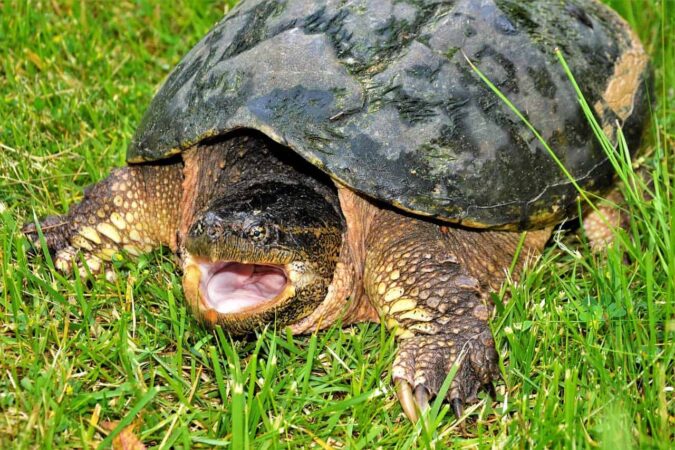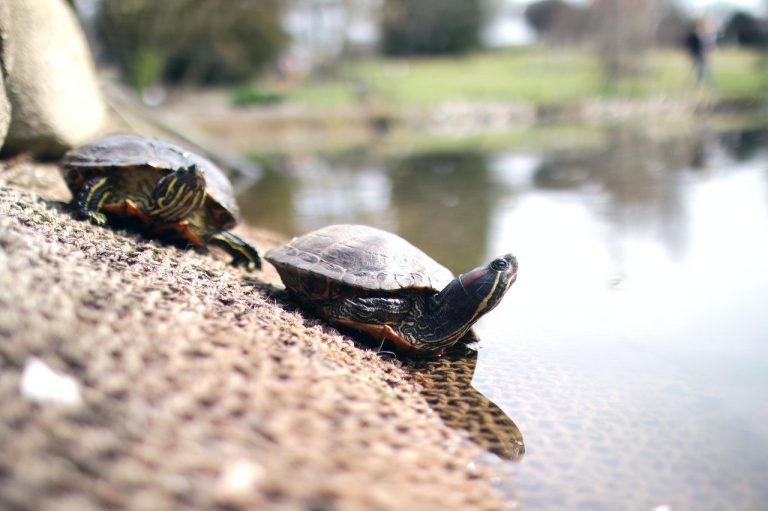Do Turtles Hiss | Is it Myth or Reality?
Many pet animals hiss to express their anger, fear, and anxiety. Cats are the perfect example of hissing whenever they feel frightened or irritated. But do turtles hiss? This is a question asked by many turtle owners, especially with those little kids at home.
Yes, turtles hiss, and it is more frequent than a pet cat or another animal will do. Interestingly enough, the hissing sound that a turtle makes is involuntary, unlike other animals. However, the act that results in the hissing of turtles isn’t involuntary.
So, why does a turtle hisses, and what you might do to stop it from hissing? Also, what does the hissing sound mean?
To get these answers, continue reading the article.
Do Turtles Hiss?
We have already mentioned that a turtle hisses. In fact, it hisses more regularly than you might anticipate before owning the turtle.
When the turtle retracts its head inside the shell, the sound seems much like hissing. The hissing sound generation is involuntary, and the turtle isn’t even aware of it. Thus, the turtle’s hissing is different from the cat’s as the cat hisses knowingly.
How Does a Turtle Produce The Hissing Sound?
You know that turtle doesn’t consciously hiss. Also, it happens mainly because of the retraction of the head. However, many people have a misconception that turtle hisses through their vocal cords, which are far from actuality.
In fact, the turtle doesn’t even have a vocal cord. So, they can’t produce any sounds, let alone the hissing sound.
So, how does the turtle hiss?
Interestingly, the turtle hissing is produced in its lungs as it expels air. But it doesn’t happen regularly. Instead, when the turtle quickly takes back its head inside the shell due to fear or predators’ attack, the lungs expel a large amount of air incredibly quickly.
This rapid expelling of air from the turtle lung results in a hissing sound. The turtle sound is intense and menacing. Nevertheless, it isn’t harmful to them.
Why Do Turtles Hiss?
So, we know that hissing is a common phenomenon for the turtle, and it is just a hissing-nothing else. But if you see the pet turtle hissing at you whenever you approach it, then the hissing is no longer a biological incident.
If you observe the turtle hissing when you want it to be pet, the indication is evident. The turtle doesn’t want to be touched at all.
The turtle’s aggressiveness when you touch it happens mainly if it is unfamiliar to you. Also, when a turtle wants to be left alone, it will hiss whenever you pet it. Thus, it will start retracting its head inside the shell, and you will hear the hissing sound.
Note that turtles are display pets. They are docile but hate being pet or touched like cats, which will often come close to you and ask for gentle touches. Turtles are solitary animals and simply dislike being touched.
Therefore, you must keep the touching and handling of the pet turtles in minimal numbers. For instance, you should touch the pet turtles only for two purposes mainly. These reasons are-
- When you have to bathe the turtle.
- When you check the turtles for injuries or sickness.
Furthermore, even when you bathe or inspect the turtle’s sickness, the touching must be gentle and as little as possible.
How Can You Stop The Turtle from Hissing and Allow it to Touch?
We understand that you might be feeling a little disappointed here. You might also be interested in knowing whether or not you can’t touch the turtle at all.
Well, the answer lies in a little waiting game. Yes, you will have to wait to get the luck to touch the pet turtles.
When you bring the turtles home, allow them to settle down and get familiar with the surroundings. Also, you must give the turtle enough time to get accustomed to you and other family members. When the turtle is used to the surroundings and knows you correctly, it will hiss less at you.
One way of developing familiarity and bonding with the turtle is to give them food with your hand. When you offer them food, the turtle will recognize you as a food source and stop hissing when you touch it.
Nonetheless, a turtle will still hiss at you if it feels annoyed even after years of staying with you. Also, during resting and basking time, a turtle is less likely to enjoy touching and will hiss at you to show its anger.
The Turtle Species That Hiss The Most
Although almost all turtle species will hiss more or less, some pet species are infamous for hissing frequently at you.
Snapper turtles are notorious hissers. Alligator snapping turtles are also known for their aggressiveness and hissing attitudes toward you. These turtles will develop bonding with the owners slowly and so, hiss even after months or years coming home.
Another turtle species that are popular yet hisses severely is the red-eared slider. Red-eared sliders hiss at you not only when it feels frightened but also if it is tired. When it rests, it keeps the head inside the carapace.
When it tucks out the head, you will hear the hissing sound.
Other Types of Sound That a Turtle Make
A turtle not only produces a hissing sound. It also generates gurgling noises and clicking sounds. However, not all turtles will cause these two sound types.
- Gurgling noise: If a turtle is facing lower respiratory tract diseases, you will see it gurgling. When you observe gurgling noises along with foamy mucus discharge, it is high time you contact the turtle vet ASAP. Otherwise, you might lose the turtle forever.
- Clicking sound: The clicking sound is made mostly by aquatic turtles and tortoises. When the aquatic species come out of the water, it generates a clicking sound. The frequent clicking sound production might be a sign that the pH level or temperature isn’t right.
Conclusion
You now clearly know why turtles hiss. Although it is an involuntary act, the reasons are not. Hence, you must provide the right temperature and tank conditions for the turtle to keep it happy. When it recognizes you and other members at home, it will hiss less.
Nonetheless, you should never expect that the turtle will stop hissing forever. Also, when you observe the clicking sound or gurgling noise from the turtle, test the water parameters and sickness of the turtle properly.


